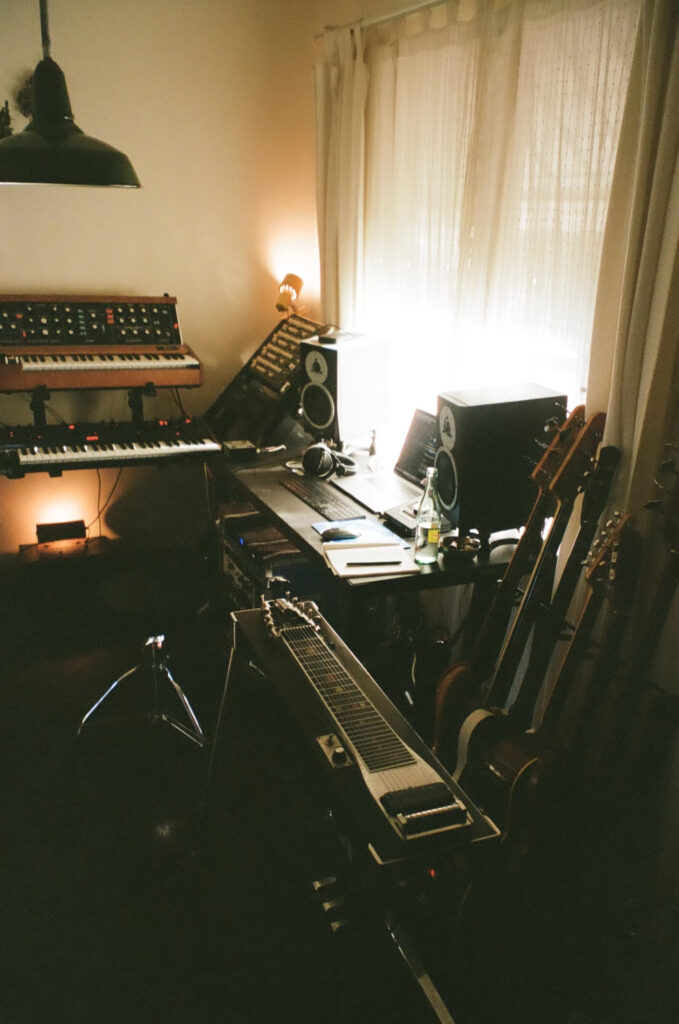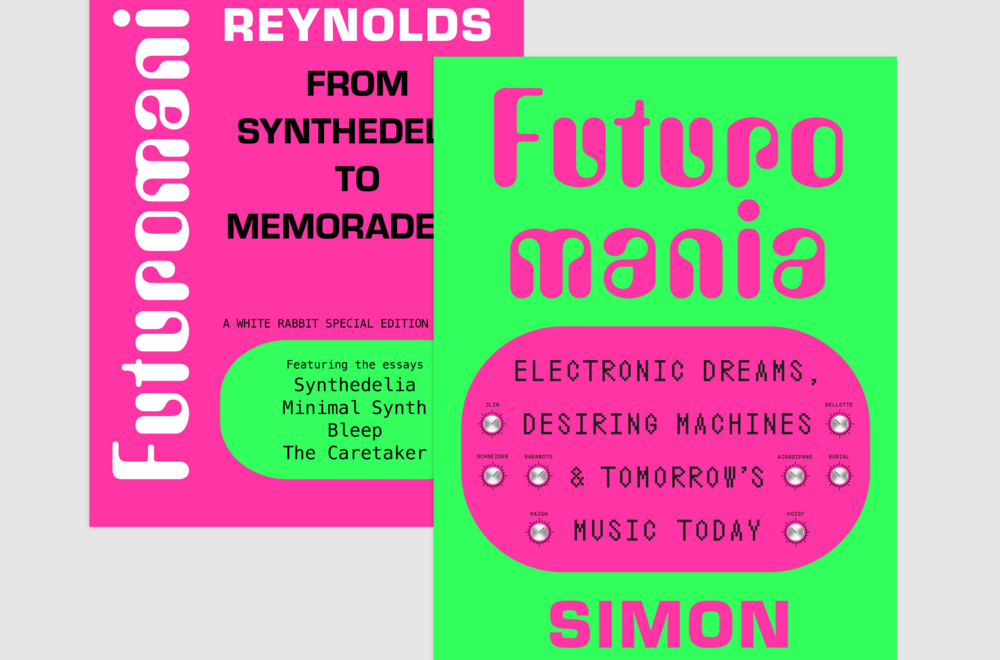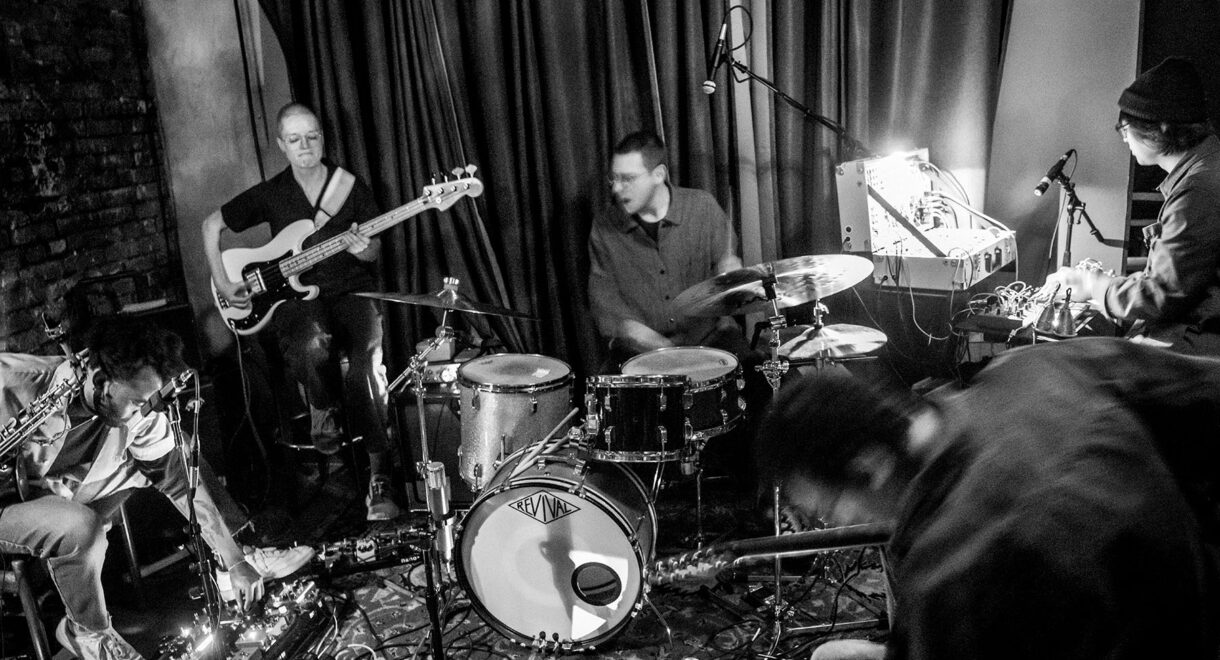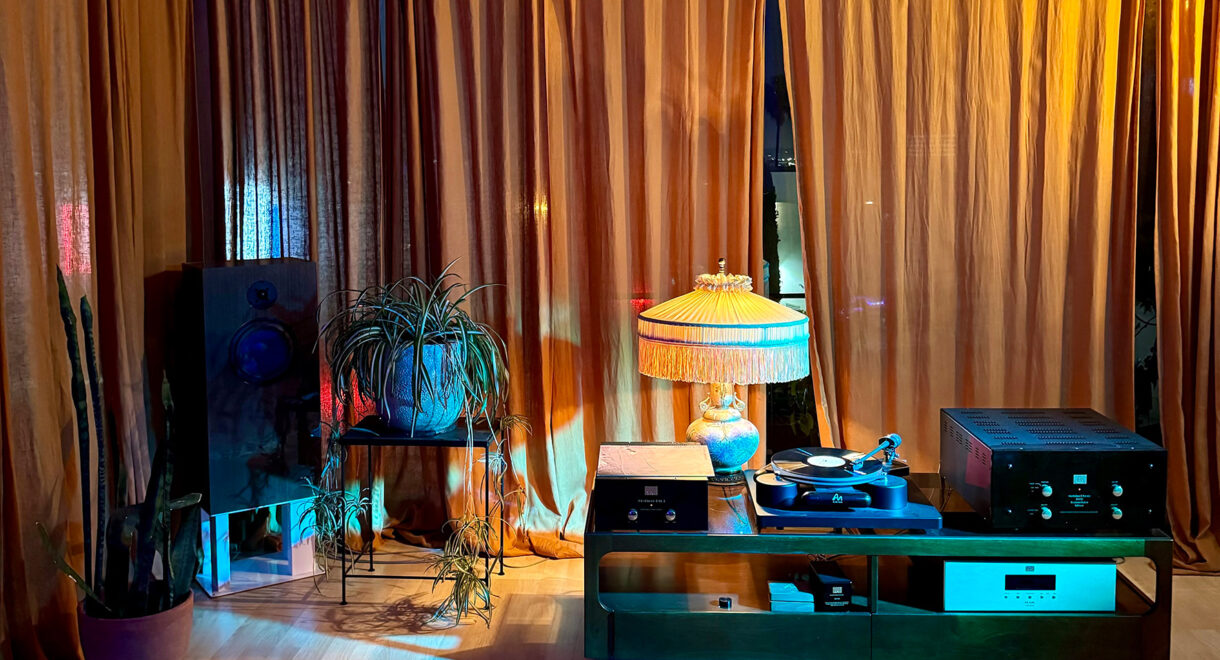The summer is halfway over and you’ve been scrolling for like, what, six weeks straight now? Step away from your phone (after reading this, of course). An analog […]
In Conversation: Daniel Aged’s Ambient Bass Improvisations

Atmospheric bass, country & gospel music, Monterey, Grown at M Bar, inc., and more with Daniel Aged.
Back in 2020, in the heart of the global pandemic, Los Angeles-based bassist, multi-instrumentalist, and producer Daniel Aged began sharing a stream of music that came across as a sort of healing salve for a broken world: two singles with Frank Ocean, including the Spanish lyric “Cayendo” where the enigmatic R&B singer softly delivers the line, “Si esto no me ha partío, ya no me partiré nunca / If this has not broken me, I will never break”; a collection of covers performed live in NYC with Zsela, including a delicate acoustic piano version of Talk Talk’s “I Believe in You” followed by Zsela’s debut EP, Ache of Victory; and an edit of Joni Mitchell’s “Shadows and Light.” The outpouring culminated in the release of Aged’s first solo material in more than two years, Bass Improvisations Pt. 1. All proceeds from the digital-only EP were donated to causes and organizations supporting racial justice and equality.
Long before his recent projects as a solo artist, producer, and collaborator, Aged was best known as one half of the brother duo inc., who released one of our favorite albums of the last decade on the iconic British label 4AD. Featuring a young Sam Gendel on saxophone, no world would help define the sound of ‘10s Los Angeles, and led the duo to work with FKA Twigs on her 2014 debut LP1 for Young Turks and with Kelela on her 2015 release for Warp, Hallucinogen. We’ve been following Aged’s work closely ever since those early days.
Four years after its initial release, Bass Improvisations Pt. 1 will be pressed in a limited vinyl run by In Sheep’s Clothing. Featuring a previously unreleased fourth track, Aged’s Bass Improvisations, Pt. 1 is a recording to luxuriate in, a series of delicate, percussion-less pieces for his beloved instrument of choice.
Pre-order is available now with vinyl shipping out week of March 15th: https://insheepsclothinghifi.com/product/daniel-aged-bass-improvisations-pt-1-lp/
In anticipation of the vinyl release, In Sheep’s Clothing’s Phil Cho spoke with Aged to learn more about his musical upbringing, formative LA parties, atmospheric bass improvisations, production work, upcoming projects, and more! Stay tuned for announcement of the vinyl release party which will feature a rare solo bass performance from Aged.
I read that you grew up in Monterey by Big Sur. What was that like?
It was pretty quiet, which is good I think for people who are pursuing some kind of craft or art early on in life. It’s less distraction which, at the time, you don’t like. You want more stimulation, cultural stimulation. But I think it’s good because it allows the imagination to fill the spaces. There were a lot of older jazz musicians that lived there too.
Do you remember any particular gigs or shows that you went to that stuck out?
It was just sort of ingrained early on. My first concert was Steel Pulse. There was a lot of good live music: soul, gospel, blues, jazz. I remember at a young age, I saw Ledisi perform, who was from Oakland. I remember such a high caliber of musicianship in the band, and she’s an amazing singer. I ended up playing with her later on.
I think another big one for me was seeing Meshell Ndegeocello’s band at Yoshi’s. It was like 2002 or 2003 with Chris Dave on drums. It was an amazing band and she’s an incredible bass player. I’d seen other performances there that were more straight-ahead jazz, but that was pushing boundaries in improvised music at a high level that was not really falling into a specific category.
There’s also the beach around there… Listening to your music there is a sort of liquid, beachside calm and sort of speed to it. Do you feel like your music is informed at all by that setting?
Yeah, I think so. I think water in general. I always have dreams about water. I’m always drawn to it. I like liquid.
“The bass is the instrument I grew up playing and I have a deep connection with it. I’m always exploring that instrument and its role within music.”
You later moved to Los Angeles and have been based here for a long time. What is it about Los Angeles that has kept you here?
I moved to Los Angeles in 2004. The more I’m here, the more I love it. There’s been times where I think I want to move and be somewhere else, but whenever I come back, I get a feeling. I get inspired just coming into the city. It’s so diverse; it’s so wild, especially back then, it felt even more dystopian, it was a totally different place. Now it just feels like I live in a different city than I moved to. A lot of people who grew up here probably have a similar thing, but being here for 20 years now, you see, especially in the past ten years, how much it’s changed. I think I’m just drawn to the sort of build your own world element of it, which is inspiring for someone who’s trying to make something that hasn’t been made.
I’ve heard a lot of stories about Mustache Mondays when Ashland (Total Freedom aka Bobby Beethoven) would play. That era of LA was before me, but everyone seems to look upon it as a really important time.
Yeah, I went to Mustache and there was also this night called Grown at M Bar. My friends Zane and Ashland put that on. inc. played there early on. That felt like a special time in LA for me and for people I was around. It felt really alive. Just before that time around 2009, I had moved away for a year and when I came back, I was like, “Oh, I don’t know anything about music or art.” It was like a whole reset, which was great. I didn’t really grow up around artists. I grew up around musicians, but didn’t think about music in that way. I went to college for two years, which was very studious, academic, jazz, and improvised music. I didn’t really understand that other side of music until maybe then when I was in my early/mid-20’s.
What kind of music was Ashland (Total Freedom aka Bobby Beethoven) playing at those spots?
Ashland is the best DJ in the world. I think the role of a DJ is creating an environment that moves people. His musical taste and knowledge is so vast. Every night that I’ve seen him in different spaces, he knows exactly what to play. Inc. did a tour with Total Freedom and Kelela. I remember we played in Portland and he was playing, what sounded like to me, Pacific Northwest music, John Fahey, blues, almost Americana, but in an experimental way. At Grown, he would play mostly older house music, Japanese fusion, city pop, and that kind of stuff. Then at Mustache, he would play bangers. He always knows how to move people emotionally and physically.
Do you feel like those nights at Mustache and Grown shaped or affected your music?
Definitely. It was my main introduction into electronic music. Zane (SFV Acid) would do live sets with his MPC and drum machines. Also my introduction to nightlife and spaces where culture could flourish. It was so diverse and open and fun; experiencing music for different purposes and functions.

“I guess bass technically isn’t atmospheric, but I think low frequencies are for sure atmospheric… in a space, like a club or a church, it’s the thing that you feel the most, and it’s the thing that fills the room.”
Music seems to be something that’s very internal for you. How do you tap into that zone? Do you have a specific practice when you go into the studio?
I haven’t really found a formula. I wish I had, but I think generally I’m just following an instinct or a feeling. I’m not sure where that comes from. Sometimes it comes before I start working, and then sometimes I’m experimenting with something, a machine, a technique, or a way of playing or a chord or something. Then that leads me to something to follow, to guide me on some kind of path. Then I step away, come back, and kind of reintegrate into that original feeling, but also maybe expand on it.
Your music isn’t inherently spiritual music (like gospel or reggae) but there’s certainly a deeply spiritual element to it. How does spirituality and music connect for you?
I’ve always been drawn mostly to devotional music; music that surrenders the self for something else. I feel like that’s when people become vessels to channel things that are truly timeless and spaceless and that are in line with God. Especially with Black American gospel music, it’s unlike anything else; it’s so deep. It has this level of musical excellence, combined with complete raw expression. With the gospel that moves me the most, like Reverend James Moore or the Clark Sisters, there’s this level of excellence with your instrument, voice, your craft, the composition, harmony, melody. There’s something that’s transcendental about it, which to me, is like tapping all parts of the spirit. You could probably listen to it from a purely mental place and analyze it and be like, “Wow, this is incredibly proficient,” but it’s impossible to listen to it that way because your spirit is going to be moved. You’re going to be taken out of your mind. I think that’s what I’m hoping to do with music in general.
Bass Improvisations Pt. 1 was originally released in 2020. How and where was this material recorded? What was going on during that time?
I was working on a long term project with an artist. Everything was taking a long time. It was really involved and an endless search, which is really fun and inspiring in ways, but I had a thirst to see what I could make and complete in a week. So I made it in a week. I was working during the day and then not working weekends, so I would work on this project in the evenings in my little apartment in Echo Park. I was just playing with melody, textures, and patterns, and seeing if I could express something in a simple format. The idea was that it would be a reoccurring thing. I haven’t made another one yet, but I will continue to make more improvised music focused on one instrument, the bass, which is the instrument I grew up playing and have a deep connection with. I’m always exploring that instrument and its role within music.
I’d love to know more about the specific instruments on this record. I’m particularly interested in the different basses and guitars used and the choices behind that?
I used a few, mostly Fender jazz bass and precision bass. I used other instruments too, but in a way that was just to expand upon certain textures I was getting out of the bass. I would have a sound that was scratchy on the strings or something like that and then expand on that with synths or acoustic guitar with noise or filters. I would play these more patternistic bass parts that were derived from funk music, and then recontextualize those on synths.
I feel like I also heard a more wooden, earthy sort of bass in there as well?
That’s true. I have this big acoustic bass that I found in a pawn shop. I always forget about it because it just hangs in my living room. I use that thing a lot. It sounds kind of like an upright. It’s amazing because it’s beautifully constructed and looks like a painting or a sculpture of an instrument. Somebody went through a lot of work to put it together, but when they put the frets in, it was completely random. So I took all the frets out, filled them in, and sanded it. It’s cool to record with because it doesn’t quite sound like an upright, but it has a woody funk to it.
“I like question marks in music; giving something for the listener to hold on to and follow, but then have their own space in the music, too… That’s what I mean by subliminal, it’s like an offering.”
Any other particular pieces of gear that informed your process?
Yeah, I used a few different pitch pedals. A Vermona synth that I really like, called a PERfourMER. I used that a lot. It was mostly bass with pedals, PERfourMER, and acoustic guitar, if I remember correctly. And then on the last track that we just added to the record, I used a pedal steel with auto tune.
Bass isn’t typically thought of as an atmospheric instrument. How do you approach creating ambience with bass? It seems like you try to do this with all of your playing and not just the solo improvisations.
I guess bass technically isn’t atmospheric, but I think low frequencies are for sure atmospheric. When I was playing a lot of upright bass, I learned that even with a sound wave of like 30 Hz or even 60 Hz, in order to really hear it or feel it, you have to be far away. You have to be in an atmosphere. I remember when I was getting my upright worked on, they were working with something on the inside, and you move it slightly and it shifts the frequency spectrum. To even hear those frequencies, you have to go to the back of this big room. So I think it’s expanding on that. If you listen on headphones, the bass maybe is not atmospheric, but in a space, like a club or a church, it’s the thing that you feel the most, and it’s the thing that fills the room.
Space seems to be a really important part of this record. Did you experiment with microphones, room placement, and that sort of thing?
I use mostly a DI on the bass, unless it’s an acoustic instrument. Sometimes I use contact microphones to get a textured sound. A lot of times, I’ll take the bass and split the signal and EQ part of it through pedals, so it almost becomes two instruments. Then I run one chain through certain pedals and run another chain through other pedals. I did some of that on this record. I’ve been doing that for a long time, since probably 2014. It was kind of something that I figured out. I was playing this Fender Bass VI and trying to make one instrument into two instruments. So I had the bottom strings all flatwound, like a bass, and then filtered the top through pedals. I would have it on a volume pedal so I could send just the high frequencies through a chain with pitch pedals and delays so that it would ring out. That’s how I created some of that ambience.
I really like the new track on the EP "1122" with the almost celestial kind of synthesizer part contrasted with that earthy bass sound. It’s grounded, but also cosmic.
I think I’m always drawn to something grounding. In all things, I like to feel grounded in some way.
You’ve described your 2021 solo album, You Are Protected By Silent Love, as “subliminal music.” You’ve also talked about your work as healing music. Did you have a similar purpose with Bass Improvisations?
I think that’s the thing that I’m always seeking with my own music. Before I made both of those records, I had a point where I basically went fully the other way. I thought, “there’s no purpose for instrumental music.” I was kind of anti instrumental music in a way. Then I came full circle. I worked on a lot of music where I was trying to sing and write lyrics. Then that became the last full-length album I put out. A lot of that music came from songs I was writing. Melodies were sung at first and then replaced with instruments. I became more interested in the poetry of it all.
I actually like to listen to a lot of instrumental music. I like question marks in music; giving something for the listener to hold on to and follow, but then have their own space in the music, too. For it not to be manipulative emotionally was maybe the goal in some of this music. That’s what I mean by subliminal, it’s like an offering. When I think about spiritual texts, it’s often left open for interpretation, which I think is the beauty in it. That’s what gives us purpose. Then we have a role in interpreting the word or sound. Even the way that we’re shown things in life, they’re often symbols and they’re not literal.
In old interviews from the inc. days, you’ve talked in detail about influences like D’Angelo, Lauryn Hill, Maxwell, and other R&B artists. Your recent music is more in the ambient realm and also has influences from country and Americana. It also reminds me of ECM a bit. When did those sounds come into your world?
When I grew up, our dad had a bunch of ECM records and CTI. He loved a lot of ‘70s jazz. With country music, I think, honestly, it came from gospel. I was drawn to the steel guitar and the history of American music, but coming through gospel, especially quartet gospel. I was exposed to that through Raphael Saadiq, who I played with for a long time, and members of his band. Growing up, I hated country music because I thought, for some reason, that it was inherently racist. It seems like there are these hard lines that divide it, but there actually isn’t in the music itself. Country music, gospel music, and R&B are so closely related to me. There are a lot of ‘90s R&B songs that were originally country songs, like “I Swear” by All-4-One was first a country song and then it became a huge R&B song.
With gospel and country, they’re both emotional music. A lot of country music is really sad and it’s not afraid to be vulnerable. They’re both not afraid to talk about heartbreak, pain, and human experience in a way that is real. At its best it allows people to experience the full emotional spectrum, but not in an oversaturated way. One of my favorites is this YouTube video of Jamie Foxx at George Strait’s tribute concert. He tells this story about how when he was growing up in Texas, he was a huge George Strait fan, but they wouldn’t let him into this club where George was performing. He then sings George Strait’s “You Look So Good in Love”.
You’ve described yourself as a more natural collaborator rather than a solo artist. Is your production writing process different when working on your own music versus when you’re working with another artist?
Yeah, I think it’s different just naturally based on the situation. I mean, I love both. They’re both so important to me. When I’m working on my own stuff, I don’t really want any input from anyone else, unless it’s a mix thing or something that’s more technical, but even that I don’t really want because it’s all connected. Working with others is so chemistry-based. That’s what’s fun about it. You never know what’s going to happen. You can test different areas of expression and emotion with somebody.
Do you have any favorite producers or ones that you look up to?
Not really. Honestly, I don’t really look up to producers that much. I mean, I look into them and information like what somebody used in the studio. My favorite producer is maybe Joni Mitchell. She did what was in her heart when she put the band together with Jaco Pastorius and Pat Metheny. That whole band is incredible. That’s like the highest level of production, as far as I see it.
What are you working on now? You were doing some stuff with Frank Ocean recently…
“No comment ;)”. I just finished an album with my friend Zsela that’s coming out, I think, in June (The first single “Fire Escape” is out now). I don’t know if that’s announced yet… I’ve been making some music with my brother a little bit. Then I’m just working on my own stuff mostly. There are a few songs that are coming out with other people; it’s kind of more pop stuff. Those were less collaborative and more the type of thing where you come in for a couple of days, and then something maybe gets placed on the record, which is cool and I’m grateful for that.
Any dream artists that you would like to produce or collaborate with?
I’ve tried to draw this together before; it’s like Andre 3000, Randy Travis and Joni… I don’t know. Even with that, though, I’ve had some experiences with people whose music I love and I’ve been very inspired by, but then I get in the room with them and it’s not working. It’s like they say “Don’t meet your idols.” I never really know until I experience the person.
Inc. no world is one of my all-time favorite albums and now a total cult classic. We received a bunch of messages about it after posting it to our online collection. How do you feel about that album after all these years?
I’m really grateful for that because when it came out, there was a lot working against us in the industry. Streaming wasn’t really a thing at that time. It was all these blogs back then and there were a lot of interviews where they’d push the album into this alternative R&B genre. I didn’t really hear it, but I guess journalists are always trying to do that. The way people hear music now seems to be less genre defined, more open. That’s what we did on that record, and what I do in general. It was confusing to work really hard on it and try to make something that felt like how we wanted to feel, and then for it to come out and not be able to continue the vision. Some people really felt it and loved it, but it didn’t sustain us at the time financially so it was kind of like, “Now what?”
I'm sure there's a lot more we can go into with that, but we'll close with this: What have you been listening to recently?
I don’t listen enough. I need to do more intentional listening… I love the Blue Nile. That’s kind of all I’ve been listening to.










